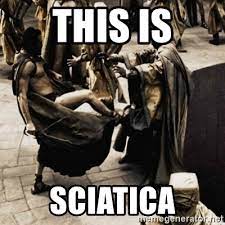
In middle school and junior high, I was obsessed with Greek mythology. I think I was into different artist renderings of the gods. Olympus’ residents seemed all-powerful, but kinda over it. Like immortality was boring and they’d rather be partying than have to deal with famine. Then we were introduced to the Roman gods and things got really confusing. I thought that my journey with mythology ended with the Teen Choice Award-winning film Troy, but as a chiropractor for sciatica in, I can say that just like Apollo and Zeus, mythology is immortal.
When it comes to healthcare, there are a lot of myths floating around. People must have more time on their hands than I thought and instead of using that time to visit a chiropractic office, call us, or do any sort of research whatsoever, they’ve decided to posit their own theories about how the body works. I’m a fan of people taking ownership of their health and healthcare, but this is not what I had in mind.
Sciatica is no stranger to the mythology of the suburban know-it-all. I say that as a proud suburban know-it-all. The sciatic nerve, the largest in the body, starts in the lower back and runs down each leg to the feet – helping to manage the hamstrings, calf muscles, lower leg muscles, and foot muscles. This nerve is not messing around. Sciatica is what we call the pain caused by the irritation of that nerve. Patients suffering from sciatica complain about pain radiating down their legs, reducing their mobility.
In their quest for sciatica pain relief, many patients come to us in search of answers, though they tend to always bring with them a barrage of fallacies stated as facts that they heard from their neighbor, Diane.
Here are a few myths that she passed along that are worth dispelling.
Myth 1: Sciatica can be self-diagnosed and treated
Apparently, Diane has x-ray vision and can tell the difference between lower back pain caused by subluxation and a herniated disc that compresses the sciatic nerve. She’s a wonder woman! Even THAT Diana doesn’t have x-ray vision.
Herniated discs, degenerative disc disease, abnormal bone growth can all put pressure on the sciatic nerve and be a possible cause of sciatica. Those issues could also cause pain unrelated to the sciatic nerve. The right sciatica treatment option depends on the correct diagnosis. A chiropractor will want to know exactly what is causing the pain in order to create a plan that will provide sciatica relief. Or if different chiropractic treatment is needed altogether.
Chiropractors take a holistic approach to treatment. The body is a single unit, so chiropractors will evaluate how the body is moving as a whole and how that is contributing to pain and dysfunction. At the Springfield Wellness Center, we take a 360º approach to pain relief and will use massage, chiropractic adjustments, deep tissue laser, spinal decompression, and custom exercises to correct the problem and take precautions so that sciatic pain doesn’t return.
Let’s see Diane do that on her own.
Myth 2: Everyone can benefit from the same sciatica treatment method
Chiropractic care plans are only established once we can find out the exact cause of the issue. We want our care to address the specifics of each patient. Just because we all have sciatic nerves doesn’t mean we should all receive the same treatment.
Not only is everyone’s body different, but social implications may require adjustments to treatment for it to be successful. Someone who has a physically demanding job will have a different strategy for care than someone who sits at a computer each day. Every patient has different baseline health, they have different habits, are of different ages, all of which affect outcomes.
Just take the eternal ice vs. heat debate. For some people with sciatic nerve pain ice may be the course of action to numb the pain and reduce inflammation. Others may respond better to heat which will relax tight muscles and increase blood flow. Ice usually works better for acute injuries and heat works for chronic pain.
Myth 3: Sciatica always resolves without recurrence
If the underlying cause of the sciatica isn’t corrected, there is a good chance it will come back again. Sciatica pain is the symptom, not the issue. The issue is a herniated disc or subluxation or bad posture all of which result in the irrigation of the sciatic nerve.
To prevent the pain from returning one can’t just apply some heat, get a massage, have a glass of wine, and call it a day. Though that would be nice.
As chiropractors, we’re not interested in managing symptoms, we’re interested in finding the root cause of an issue and correcting it so that our patients can live their best lives without pain, fear, or the inconvenience of injury.
Myth 4: Bed rest helps heal sciatica
Many people think that because sciatica can make it painful to walk, they should stay off of their feet.
No Diane, it’s not.
A structured exercise routine is actually the best way to manage pain and can also help to address the underlying issue. Bed rest and limited movement may be necessary during a flare-up, but prolonged periods of inactivity may actually exacerbate the problem. Exercise improves muscle and bone strength, increases range of motion in the joints, lowers stress, and promotes healing. Exercise doesn’t have to be heavy weight lighting in a gym next to a guy who’s wearing a 1/3 of a shirt and grunting more as a mating ritual than as a demonstration of his exertion. It can also be this:
Look, I’m not mad at Diane. She’s probably a great neighbor; she likes to drink wine, gossip, and she’ll always let you borrow her sports jackets. But our health is too important to entrust it to someone who learned their medical knowledge from Call the Midwife, Sundays on PBS. We know that pain is not normal, it is our body’s alarm system alerting us to a problem. Sciatica pain is the alarm. The lights are flashing. Let us determine the underlying cause so we can turn off the alarm. Call us or schedule a time to meet with one of our amazing doctors. We’ll show Diane that living a healthy and pain-free life is possible and it’s gonna blow that hat right off of her head.

